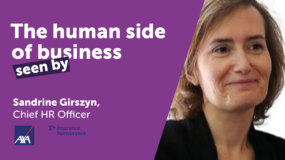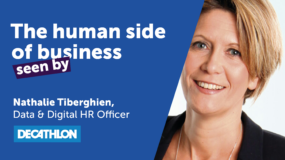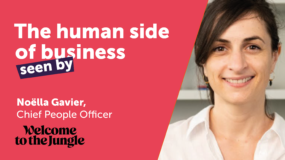Sandrine Girszyn : “HR have to continue to create their own credibility in the eyes of the other functions and thus change the way they are perceived”
This is our fifth edition of “The human side of business as seen by…”, a series of interviews with people who believe that resources are above all human. Whether they are HR, managers, company directors or researchers, they all share their vision of the world of work and its transformations.
For this new interview, we had the pleasure of talking with Sandrine Girszyn, Chief HR Officer, APAC & Europe at AXA XL. She tells us about her career in HR, but also her vision of the function as it evolves today, and the human issues that companies will face.

Chief HR Officer, APAC & Europe chez AXA XL
What is your relationship with HR and how did you become a CHRO?
I have been working in HR for over 20 years. Initially, I worked in dedicated areas of expertise (recruitment, training, etc.) before moving on to generalist HR Business Partner functions and managing HR teams in several entities in both France and Europe. Two years ago, I became Chief HR Officer for the APAC & Europe Business Unit of AXA XL.
I have always been committed to regular exchanges with the business leaders I support. This allows me to have a genuine understanding of the operational challenges and to ensure that all HR initiatives have a strong impact and are connected to the reality on the ground.
I believe that people are the heart of an organisation and its transformations. I see my role as that of a “mediator” at the crossroads of individual and collective projects, between the ambitions of a large organisation, one of its divisions and its local operations. At the end of the day, our mission is to drive forward both the business and the individuals within the organisations.
From your point of view, what human challenges do businesses face today? Is the human element sufficiently taken into account?
When talking about current HR issues, it is important to put them in the context of the global pandemic that we have all experienced over the last two years. Particularly because it has highlighted the importance of people in organisations, as well as one of the major challenges facing companies today: the pursuit of meaning at work.
Given the physical and psychological distancing caused by the pandemic, we have observed that more and more employees are questioning the meaning of their work and its relevance to their personal aspirations. We are carefully observing these developments, taking them into account and aiming to bring back the meaning.
We also need to think about the new ways of working and the digitalisation that has accelerated. In the context of hybrid work, we need to recreate a way of working that maintains connections and creates a sense of belonging – and this must start with managers, who are key levers in achieving this commitment.
Another major issue that has emerged in recent years within companies is that of employees’ mental health. How do we address this issue within a company? Today, more than ever, organisations need to ensure that new ways of working, which can result in employees becoming hyper-connected, do not compromise their satisfaction and resilience and do not leave them trapped in long working days.
In the context of hybrid work, we need to recreate a way of working that maintains connections and creates a sense of belonging - and this must start with managers, who are key levers in achieving this commitment.
What is your vision of today’s HR?
The HR profession has shifted from a ”transactional” to a ”strategic” function that supports organisations in their transformation, and this is exactly the kind of dynamic I see our role today.
Currently, the HR function is playing an increasingly important role in the Executive Committee and is participating in strategic business projects at an early stage. Our role is therefore to ensure that individuals are placed at the heart of projects, because the HR function is there to act as a bridge between employees and the organisation.
This of course requires a shift in the HR posture whose role must evolve. Tomorrow’s HR has a strategic role to play: to challenge the status quo and the leadership teams within the organisation, to become a true “business partner” and to provide the company with new perspectives such as inclusion and diversity, skills development, employability, meaning at work, etc.
What changes will the HR function undergo in the future?
To achieve this strategic partnership with the business, the HR function will move towards a coaching role. Coaching leaders, managers and all employees means constructively guiding, advising and challenging them.
Transformations cannot be carried out alone, but rather in cooperation. It is up to us, HR, to take advantage of this recent spotlight in order to share our convictions and to highlight the actions we will be implementing so that the business understands the importance of our role in accompanying a change, and more broadly, in corporate transformations.
In order to have a vision and to work with the business, we must dare to take the lead. We will have to continue to create our own credibility in the eyes of the other functions and thus change the way HR is perceived within organisations.
What skills will the HR have to develop tomorrow?
I believe three skills will be crucial for the HR function of tomorrow.
The first is “business acumen”, which means the HR function’s knowledge of the business. To be able to better support the business, we need to have a common language and understand the operational problems of each function in order to anchor our actions in the reality on the ground.
The second is the development of our leadership skills. Being a leader in an organisation means being able to define a vision, to take courageous decisions, to accompany changes. It is therefore not just a matter of defining HR policies, but rather of “leading” them, carrying them out, embodying them and bringing them to life.
Lastly, the third skill is communication. Historically, the HR function has been considered a back office role, and has not always been able to put itself forward. We realise that in order to have a vision and to work with the business, we must dare to take the lead. We will have to continue to create our own credibility in the eyes of the other functions and thus change the way HR is perceived within organisations
In your opinion, what is the next major HR challenge?
I believe that the main challenge for the HR function will be to support organisations in the upcoming crises and transformations. Until a few years ago, these issues were occasional and seasonal (editor’s note: reorganization projects, economic crises, etc.), but they have since intensified while at the same time the time horizon has become much shorter.
Future HR will therefore have to react more quickly, more regularly and more effectively to different transformations that will constitute our daily lives. The key challenge is therefore agility and resilience.
We will also be living in an even more connected world, which will continue to challenge the our function and lead it to seek for answers to issues related to the sense of belonging to a company, the creation of bonds between employees and the protection of their mental health.
However, in order to move forward, we must also ask ourselves the right questions: what human relationships do we want to create, are they virtual or physical? How will we manage to maintain the link in an ultra-connected world, the organisation being by essence a place of meetings and exchanges?
There are also other challenges that can be identified like an individual’s place in the organisation. We talk a lot about “retention”, “attraction”, “resignation” or “employee experience”.
Adaptability of HR will therefore be necessary to respond effectively to the numerous issues that companies are facing, such as the war for talents. Agility is the next challenge for HR in order to support companies in their economic, structural and organisational changes.



